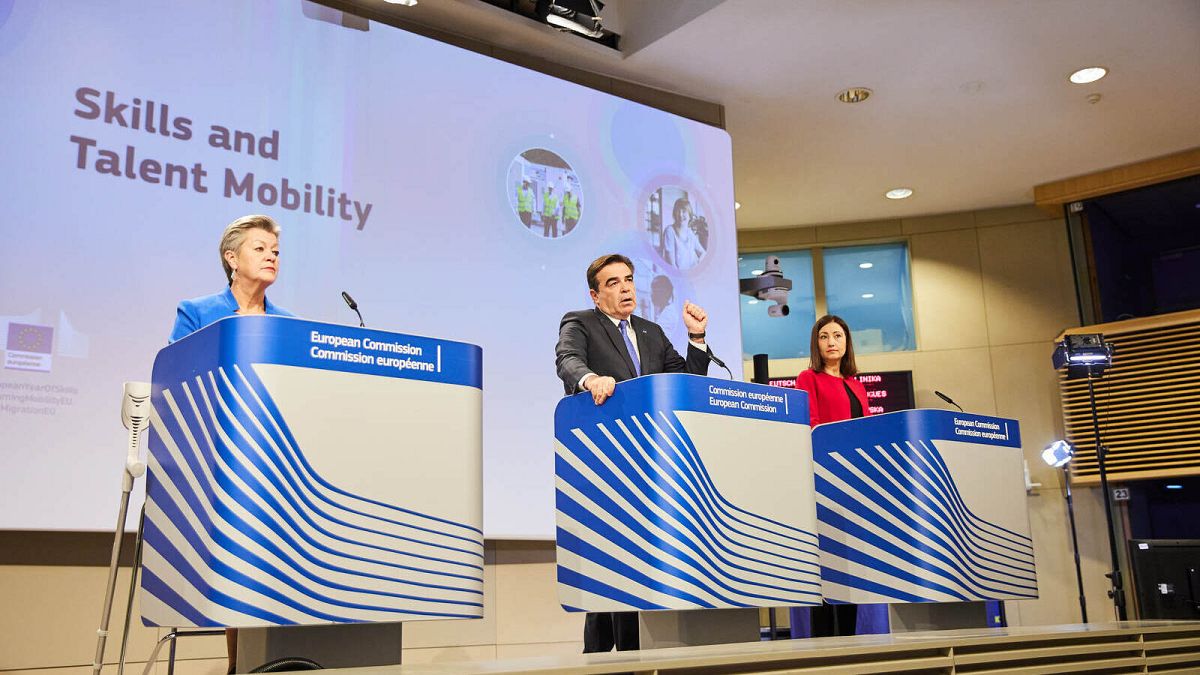The European Commission has tabled plans for a new platform to match migrants with job offers across the bloc as concerns mount over an increasingly tight EU labour market.
Described by EU home affairs chief Ylva Johansson as "Tinder for jobs", the so-called EU Talent Pool would connect migrant job seekers with the right vacancies according to their skills and qualifications, helping to address critical shortages in the EU's domestic labour market.
Participation in the talent pool is voluntary for member states, but Brussels hopes incentives such as funding for vocational training and upskilling will incentivise capitals to opt in.
The platform will be based on the existing EURES platform, which links European workers with job offers in other EU countries.
"This talent pool is not about challenging national competence for deciding on quotas for labour migration. It's about facilitating the recruitment of the right skills, as easy, as swift as possible," Johansson explained, adding that many member states had called on Brussels to help coordinate the matching of skills with shortages.
As baby boomers retire and the working population shrinks, many sectors in the bloc face stubborn shortages in skilled workforce, with construction, healthcare and IT particularly hit according to the European Commission.
The bloc needs seven million more workers in its labour market by the end of the century due to demographic change. The EU executive has already sounded the alarm over the potential economic fallouts of the projected upending of the labour market, warning of immense pressure on public budgets, pensions and the healthcare system.
Domestic workforce 'not enough'
"We should not forget the untapped potential in EU domestic workforce, but it is not enough," European Commission vice-president Margaritis Schinas said.
"We really are going to need more of labour migration," Johansson added, explaining that without the 10 million third-country nationals working in the EU, representing approximately 5% of its workforce, the bloc's economy would essentially "stop."
Johansson, the EU executive's chief on migrant policies, also said the Talent Pool could help discourage migrants from embarking on dangerous journeys to the bloc through smuggler-facilitated routes and thereby reduce the number of irregular arrivals.
"We are stepping up when it comes to preventing irregular arrivals, when it comes to prevent deaths in the Mediterranean and Atlantic. But to do that effectively, we also need to provide legal pathways," she explained.
But while labour migration is seen in Brussels as one of the key solutions to cracking down on irregular arrivals while filling in the gaping holes in the labour market, some EU governments are taking a different line.
Governments of all political colours, including France, Italy, Hungary and Poland, are experimenting with pro-natalist policies to boost birth rates and fill labour shortages, an approach favoured especially by hard-right governments.
Hungarian Prime Minister Viktor Orbán and Italian Premier Giorgia Meloni have notably introduced incentives such as tax breaks and pay-outs to reverse their country's rapidly shrinking population.
But Schinas warned against falling for the "miracle solutions" proposed by demagogues and populists.
"We are now used to the toxicity that some political forces want to introduce into the public debate on migration. They promise that the magic solution is closing down borders, going back to nationalism, refusing all sorts of negotiations with neighbours, with Brussels," he said.
"We do not take this route [...] And we will continue to oppose this populist discourse," he added.
A global race for talent
Schinas pitched the plan as a "foreign policy tool" as much as a social policy tool, as it aims to step up Europe's industrial competitive edge on the global stage, with increasing demand for the skills needed to decarbonise and digitalise parts of the economy.
"Europe is engaged in a global race for talent. In the same way that we are fighting a global race for raw materials and for energy, we are also fighting a global race for talent against very powerful competitors who have straight-forward avenues for third-country nationals: the United States, Canada, New Zealand and Australia," he explained.
The platform is designed to tackle shortages in both low, medium and high-skilled sectors, with a particular emphasis on strategic sectors "linked to the green and digital transition."
The bloc also called on member states to simplify their processes for recognising foreign competencies and qualifications, saying red tape was discouraging skilled workers from immigrating, a phenomenon called 'brain waste'.
Racism is also a stain on the bloc's reputation in the world and risks preventing skilled third-country workers from applying for jobs, according to Johansson.
"We also need to fight to fight racism because this is also an obstacle for skilled people to choose to come to the European Union," Johansson said.
